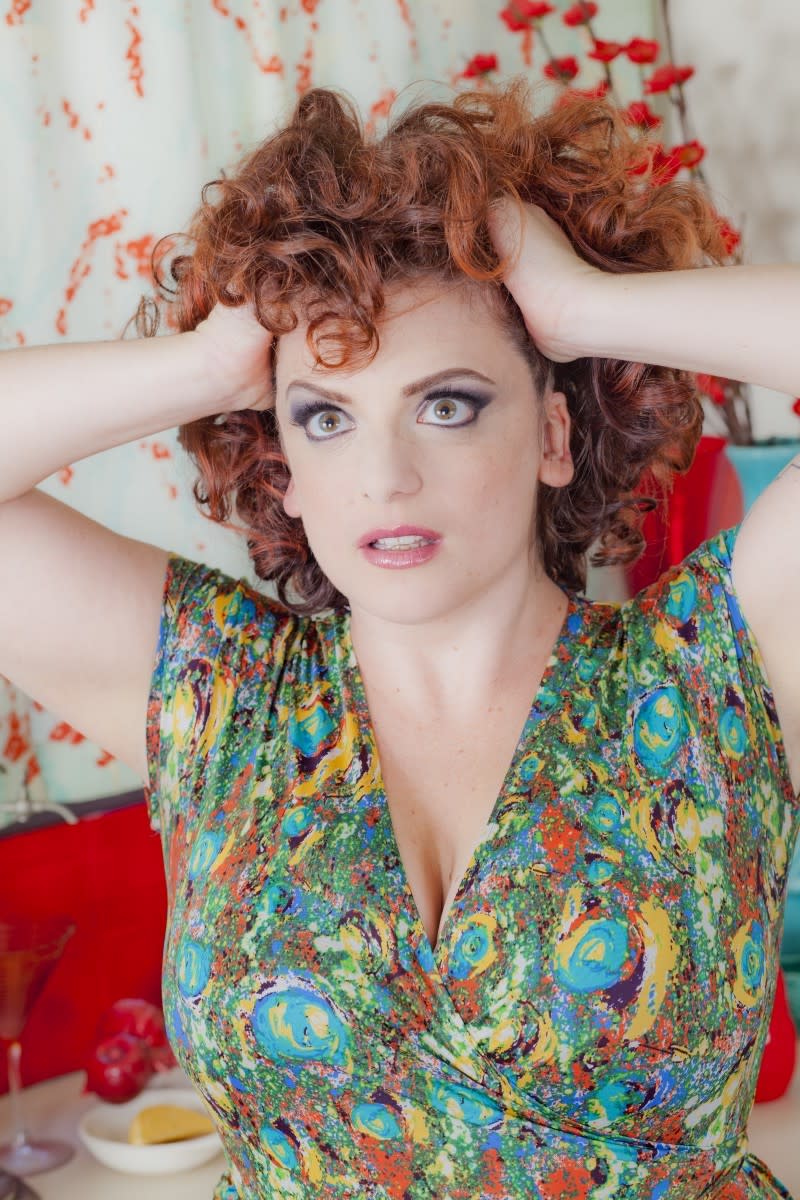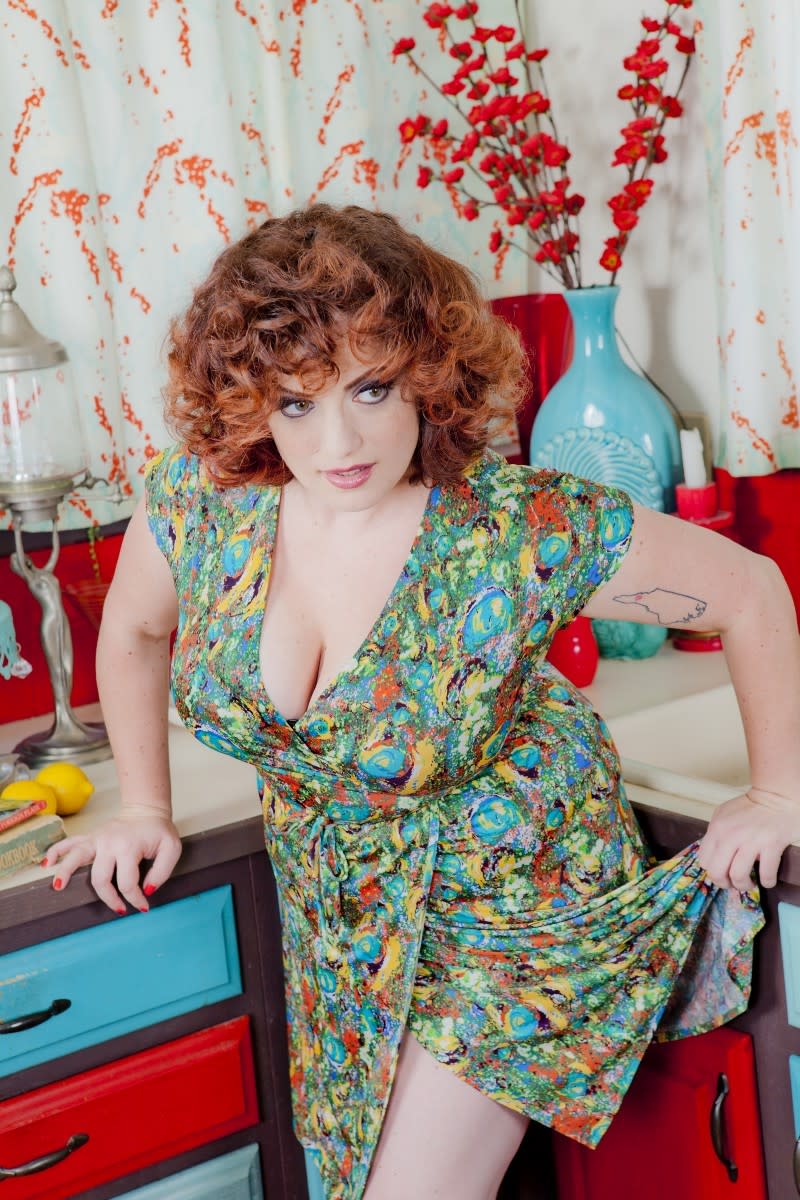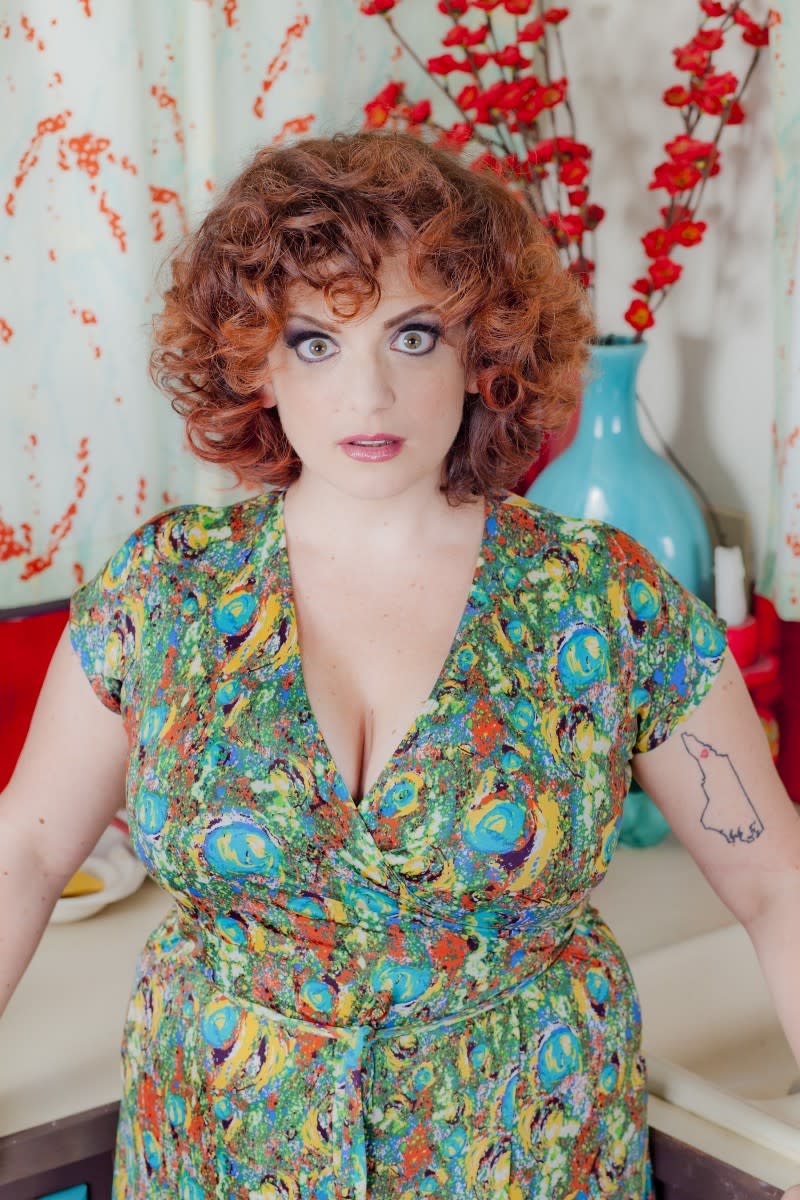A Fan Asked Her Why She Got Fat. So, She Told Him

Sara Benincasa shared her frustration about being asked about her weight. (Photo: Iconic Pinups)
Comedian and writer Sara Benincasa has more than 40,000 Twitter followers, so it feels pretty safe to say that she has a substantial fan base. And after one fan recently wrote to Benincasa, asking her, “Why did you gain so much weight?” she took to Medium to draft a very thorough response.
In her essay, “Why Am I So Fat?” Benincasa breaks it down — not just for the fan but also for the world at large — about why it’s incredibly problematic when people think that they have any kind of authority or entitlement over other people’s bodies, and so little concern for the actual person who lives in that body.
“I’d imagine the context was this fellow was looking at my videos and images from 10 years in comedy and being annoyed that I gained weight,” says Benincasa. She told Yahoo Style of how the email triggered her epic, thoughtful, essential reply: “Or, perhaps wanting to gain some power over me by commenting and making me feel bad. I’m 35 and I’ve been in comedy since I was 25, so yes, I’ve gained weight (and lost, and gained, and lost).”
Benincasa says that she makes a point to try to thank fans and supporters for their kind words and support as often as possible. So when she received that message about her weight, she thought, “What if I simply responded to this person, using the energy of my annoyance to power a genuine response based in humor?” She says she wrote the post in 10 minutes, later going back and adding photos for extra impact.
Benincasa says: “I truly didn’t think it would take off. I thought most folks who read it would get a chuckle and maybe a bit of insight into how men speak to women on the Internet. That’s it. But it’s gone so nuts. So many folks relate.”

Photo: Iconic Pinups
Benincasa’s post has received more than 1,200 likes on Medium, 446 shares from her own Facebook page and more than 1,200 retweets from her Twitter account in only 24 hours.
She explains her post’s resonance. “You can put a photo of yourself holding your daughter on Facebook. And a cousin’s cousin can write, ‘Wow, you really got big after the pregnancy, huh?’ Or ‘If you want to know about how to lose the baby weight, ask me! I teach Zumba.’ Really undermining stuff that isn’t kind and that makes folks feel bad. Anyone’s image is up for public consumption on Facebook, even if you only have 30 friends there.”
In her post, Benincasa also mentions how remarkable it is to hear only criticism of her weight without her facing an anonymous rape threat. The seemingly “casual” and anonymous rape threat has become an unfortunate, dangerous and toxic part of daily life for women on social media, she says, and women in comedy face threats of sexual violence from total strangers with all-too-great frequency.
“First things first, thank you for not threatening to rape me! I get rape threats because I’m a woman on the Internet,” Benincasa writes. “Rape is on trend for women in comedy in 2016 and always! I respect that you bucked the trend to fall back on a comment about my weight. This is a more traditional approach and one with which I and my peers are intimately familiar.
“I’m not even a ‘real’ famous person — I think of somebody like Kerry Washington as a real famous person, you know? I’m not a superstar. But if I get threats like this, imagine what Kerry must get. Or Lena Dunham, good Lord, she gets so much. Or America Ferrera, somebody who is so beautifully political and refuses to apologize for caring about what happens to people with fewer privileges than she. Imagine what they get. It scares me a little, but it upsets me more. I’ve only ever had to have a bouncer walk me out of two [comedy] shows. I know women [comics] who have to be escorted all the time.”
Benincasa notes the unrelenting presence of threats of violence, especially sexual violence, to those in the public eye and to women in comedy, in particular. “Rape is an act of power. A man who feels powerless in comparison to a woman who has a public voice? He will feel angry. He will feel shame. And he may choose to channel that into a threat of violence that he may well never act [on]. But I can’t know if he’s going to act or not. I have to simply protect myself as best I can and leave the rest up to fate. It’s sad to say, but I truly cannot control it.”

Photo: Iconic Pinups
“We treat women like objects,” Benincasa told Yahoo Style. “Women treat women like objects. I even do it sometimes. I’m not immune. But many men feel entitled to say whatever they wish about my face or body because I’m not a full human being to them. I’m a woman. I’m an object to be viewed and judged and f***ed, and I should not have agency of my own. I’m used to this attitude from a lot of dudes. I love guys overall and have so many great guy friends and relatives. Some of them will get mad and want to punch a guy who acts inappropriately. I appreciate the sentiment, but it won’t change anything. And it’s probably makes things worse for me. Guys should remember that when they want to cowboy up on a man who hurts their woman friend — it’s gonna come back to hurt us much of the time. It inflames the situation. Makes the offender want to enact revenge. And when he does, he’s not coming for you, guy friend.”
In the meantime, Benincasa continues to help push for a culture shift in how we objectify women and women’s bodies. She does this through her work and writing — including things like her recent Medium post.
“If I push back, maybe it changes some men’s minds. But I’m doing it really to encourage other women to push back and take power,” she says. “I don’t see the relationship between men and women as inherently adversarial. I do see it as complex. Men don’t need to apologize for their brethren who are douchebags. They just need to not be douchebags themselves. Same with gals, but men have so much more power than us.”
Of course, Benincasa wishes that all the time spent talking about women’s bodies and what they weigh could be spent calling attention to much more pressing issues.
“We could instead talk about catastrophic flooding in Louisiana, lives lost to gun violence every day, children in this country who get kidnapped who aren’t pretty little blond white girls. The fact that People magazine just did a cover with JonBenet Ramsay when black kids die of gun violence on the streets of Chicago every day? It’s f***ing disgusting. I’d say there’s a lot more to cover than whether Kylie got ass implants or Khloe ate a carrot stick.”
And none of those things needing to be covered have anything to do with how much Benincasa, or any woman, weighs.
Benincasa’s latest book, Real Artists Have Day Jobs, is on sale now.
Follow us on Instagram, Facebook and Pinterest for nonstop inspiration delivered fresh to your feed, every day.

